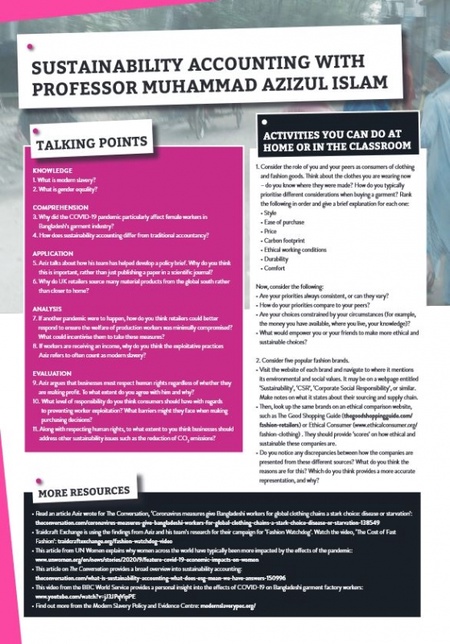Unethical working conditions are a major issue in many parts of the world, and workers are often exploited by retailers in wealthier countries to maximise their profits. Professor Aziz Islam, Chair in Accountancy at the University of Aberdeen is investigating how societal demand for sustainability accountability and transparency can help drive these organisations towards ethical practices.
Alongside Professor Pamela Abbott and Dr Shamima Haque, Aziz has run a project investigating how the COVID-19 pandemic has affected Bangladeshi workers, especially women, and is using their insights to develop policy recommendations. “Lockdowns and decreased demand led to the cancellations of orders by retailers, which in turn led to garment factory closures and job losses, leaving around 2.8 million Bangladeshi workers facing poverty and hunger,” says Aziz. “In factories that remained open, workers were forced to work in unsafe conditions where they were vulnerable to catching the COVID-19 virus and passing it on to their families.”
Aziz’s latest research project focuses on the ready-made garment (RMG) production industry in Bangladesh. This industry supplies clothing and fashion products to multinational companies across the global north – retailers that you are very likely to have heard of, and even bought from. “These RMG companies have moved their production locations to the global south to minimise production costs,” says Aziz. “The reason that labour costs are so much cheaper is because of slavery and exploitation.” Which begs several questions: As buyers, are we benefitting from unethical practices? Are we buying cheaper products at the expense of the workers who make them? How can we hold parties involved accountable? The garment industry is massively important for Bangladesh’s economy, accounting for 80% of its export earnings and about 20% of GDP. It is a big industry, but is it one that we can – and should – influence with our purchasing power?
This blog was written by Professor Aziz Islam for Futurum Careers, you can read the original article and more about the research project here.
Futurum Careers is a free online resource and magazine aimed at encouraging 14-19-year-olds worldwide to pursue careers in science, tech, engineering, maths, medicine (STEM) and social sciences, humanities and the arts for people and the economy (SHAPE). For more information, teaching resources, and course and career guides, see www.futurumcareers.com


